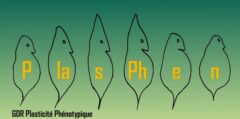Les 23-24 novembre 2023 s’est tenue la dernière réunion annuelle du GDR plasticité phénotypique, marquant la fin du second mandat (2019-2023, après un 1er mandat 2015-2018). Réunis dans l’amphithéâtre de la délégation du CNRS à Montpellier, nous avons échangé sur l’ensemble des thématiques du GDR, depuis les mécanismes moléculaires et développementaux de la plasticité jusqu’à ses conséquences pour l’écologie et l’évolution des populations, avec des approches allant des expériences au laboratoire jusqu’aux suivis in natura, sans oublier la philosophie et l’histoire des sciences (voir programme ci-dessous). La première journée s’est achevée par une table ronde sur la dynamique de la plasticité dans et entre les générations, la manière d’en faire un objet d’étude expérimental, et de la distinguer des dynamiques évolutives. La second journée s’est conclue sur les perspectives pour faire vivre le réseau suite à la fin du GDR. Pour l’année 2024, les principaux rendez-vous seront la conférence Jacques Monod Life is Plastic, et le colloque de la SFE² à Lyon, qui inclura une session sur plasticité et évolution.





Programme du colloque:
| Jeudi 23/11 | ||
| 14:00 | Luis-Miguel Chevin | General introduction to the GDR and the meeting |
| Session 1: Characterizing plasticity across traits and scales | ||
| 14:20 | Giulia Cheloni | Phenotypic plasticity in Chlamydomonas reinhardtii: contaminants exposure induces the transition from unicellular to colonial lifestyle |
| 14:40 | Léo Dejeux | Transcriptomic signatures of within- and trans-generational predator-induced plasticity in Physa acuta |
| 15:00 | Coffee Break | |
| Session 2: Plastic rhymes with dynamic! | ||
| 15:30 | Léonard Dupont | Beyond reaction norms: the temporal dynamics of phenotypic plasticity |
| 15:50 | Giacomo Zilio | The role of evolution and plasticity in changing environments: insights and ideas from the ComplexAdapt meta-experimental evolution |
| 16:10 | Round table on dynamics of plasticity | |
| 17:00 | End of first day | |
| 19:00 | Dinner in downtown Montpellier | |
| Vendredi 24/11 | |||
| Session 3: Thinking about reaction norms | |||
| 09:00 | Pierre De Villemereuil | Partitioning the phenotypic variance of reaction norms | |
| 09:20 | Paul Acker (visio) | Phenotypic plasticity of discrete traits | |
| Session 4: Plasticity in the ecological arena | |||
| 09:40 | Mélanie Thierry | Local or spatial: phenotypic and dispersal plasticity facing thermal changes | |
| 10:00 | Céline Teplitsky | Variabilité de la plasticité entre populations et individus dans des populations naturelles de mésanges | |
| 10:20 | Coffee Break | ||
| Session 5: Connecting plasticity with evolution | |||
| 10:50 | Luigi Garaffa | Plasticity Led-Evolution: A matter of causal relevance | |
| 11:10 | Tom Van Dooren | Development, plasticity and evolution | |
| 11:30 | Laurent Loison | Au-delà de Schmalhausen? Plasticité phénotypique, évolution darwinienne et biologie russophone (1930-1990) | |
| 11:50 | Group photo | ||
| 12:00 | |||
| 13:30 | Introducing the Jacques Monod Conference Life is Plastic 2024 Discussion about future of the network |
||
| 14:15 | End of meeting (and GDR!) | ||

